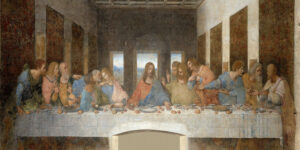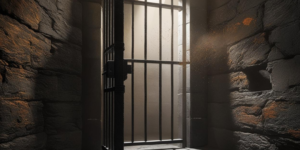The Wrath of God Is Coming
The Bible speaks of the day in which Jesus will “tread the winepress of the fury of the wrath of God the Almighty” (Rev. 19:15), a day when He will come “in flaming fire, inflicting vengeance on those who do not know God and on those who do not obey the gospel of our Lord Jesus” (2 Thess. 1:8).
Almost all the writers of the New Testament spoke of this day when the wrath of God would be poured out on the earth. Why is it that so few of us speak about it today? Why aren’t we sounding the alarm?
When Paul exhorted believers to live holy lives and to abstain from sin, he reminded them that wrath was coming on the disobedient and ungodly.
To the Ephesians he wrote, “Let no one deceive you with empty words, for because of these things the wrath of God comes upon the sons of disobedience. Therefore do not become partners with them” (Eph. 5:6-7).
To the Colossians he wrote, “Put to death therefore what is earthly in you: sexual immorality, impurity, passion, evil desire, and covetousness, which is idolatry. On account of these the wrath of God is coming” (Col. 3:5-6).
Did Paul know something we don’t know? Was there a reason he wanted to remind the godly about the fate of the ungodly? Did he feel it would help us not play games with sin?
Paul actually wrote about God’s wrath one-fourth as many times as he wrote about God’s grace. Do we follow his lead?
In his short little book, Judah (Jude) found it important to quote this prophecy from Enoch, “Behold, the Lord comes with ten thousands of his holy ones, to execute judgment on all and to convict all the ungodly of all their deeds of ungodliness that they have committed in such an ungodly way, and of all the harsh things that ungodly sinners have spoken against him” (Jude 1:14-15).
Why did he emphasize this? Why not just speak about the love of God (which he does as well; see v. 21)? Why remind the righteous about the coming judgments on the unrighteous?
Some teachers today try to downplay this theme by claiming that the verses that speak of Jesus coming in flaming fire and wrath referred to the destruction of Jerusalem in 70 A.D. Are they right?
Certainly, Jesus did warn about the coming destruction of Jerusalem both directly and in parables (see, for example, Matt. 23:37-39; Luke 19:42-44; Matt. 21:33-45).
But it is the height of absurdity to reinterpret all these wrath-related Scriptures to fit that singular event, especially in light of Paul’s frequent references to the coming wrath, as if he was saying to believers in Ephesus, “Don’t play games with sin, because Jerusalem will soon be destroyed.” Hardly!
Worse still is the tendency in some hyper-grace circles to eliminate the wrath of God by simply removing it from the Scriptures, as the Mirror Bible does at times.
As I pointed out in my book Hyper-Grace: Exposing the Dangers of the Modern Grace Message, in the ESV, Romans 1:17 reads: “For the wrath of God is revealed from heaven against all ungodliness and unrighteousness of men, who by their unrighteousness suppress the truth.” In the Mirror translation, it becomes: “The righteousness of God that is endorsed in the heavens is in such contrast to the counterfeit earthly reference that blindfolds people in their own unrighteousness.” What happened to God’s wrath?
Or consider Colossians 3:6, which we quoted earlier: “On account of these the wrath of God is coming.” In the Mirror translation, it becomes, “These distorted expressions are in total contradiction to God’s design and desire for your life.” Yes, “wrath” has completely disappeared once again!
But most teachers and preachers today have not gone so far as to eliminate God’s wrath from their Bibles or to interpret it away. They simply ignore it. Why?
Revelation 6 presents this shattering, overwhelming account: “Then the kings of the earth and the great ones and the generals and the rich and the powerful, and everyone, slave and free, hid themselves in the caves and among the rocks of the mountains, calling to the mountains and rocks, ‘Fall on us and hide us from the face of him who is seated on the throne, and from the wrath of the Lamb, for the great day of their wrath has come, and who can stand?'” (vv. 15-17)
Do we just ignore this because Revelation is hard to understand? Shouldn’t this rather shake us to the core because, as surely as God is God, His wrath will one day be poured out on a sinful and rebellious world?
Peter, like Paul, told us that this should affect the way we live today.
First, he describes what is coming: “But the day of the Lord will come like a thief, and then the heavens will pass away with a roar, and the heavenly bodies will be burned up and dissolved, and the earth and the works that are done on it will be exposed.”
Then he makes application: “Since all these things are thus to be dissolved, what sort of people ought you to be in lives of holiness and godliness, waiting for and hastening the coming of the day of God, because of which the heavens will be set on fire and dissolved, and the heavenly bodies will melt as they burn!”
And he adds this promise: “But according to his promise we are waiting for new heavens and a new earth in which righteousness dwells. Therefore, beloved, since you are waiting for these, be diligent to be found by him without spot or blemish, and at peace” (2 Pet. 3:10-14).
The wrath of God is coming, and a new heaven and earth are coming.
How then should we live, and what then should we preach?
Michael Brown is the author of Can You Be Gay and Christian? Responding With Love and Truth to Questions About Homosexuality and host of the nationally syndicated talk radio show The Line of Fire on the Salem Radio Network. He is also president of FIRE School of Ministry and director of the Coalition of Conscience. Follow him at AskDrBrown on Facebook or at @drmichaellbrown on Twitter.






































